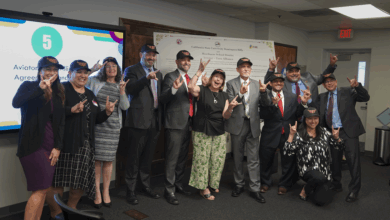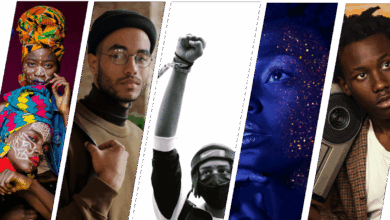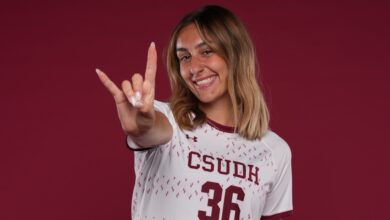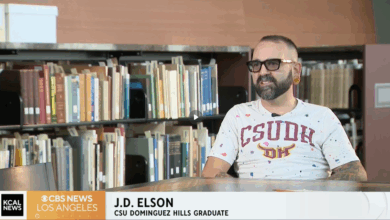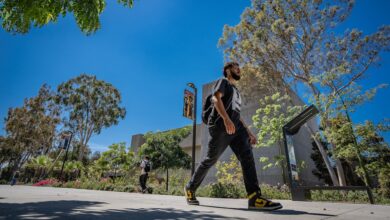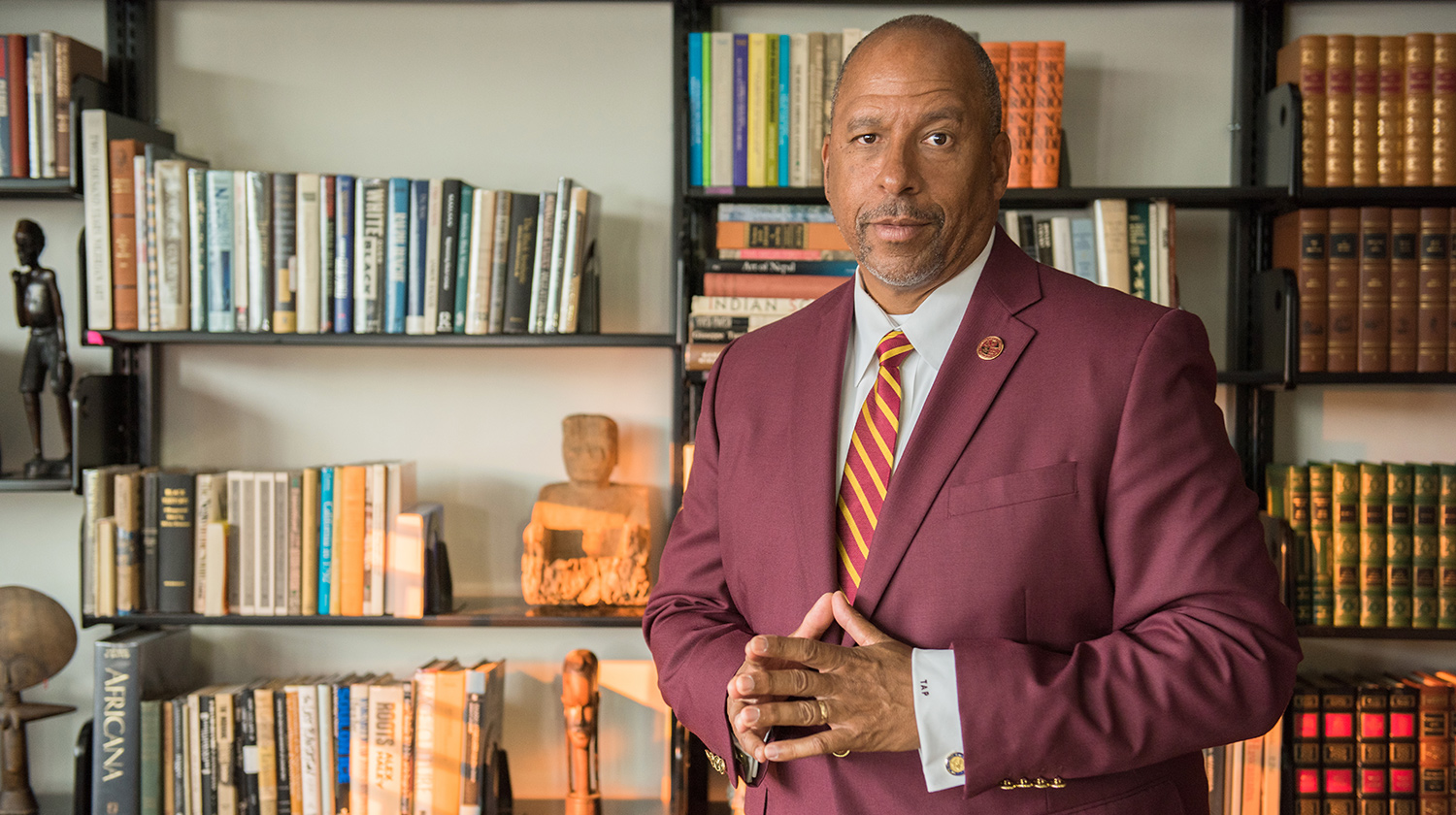Our faculty members participate in conferences around the world, conduct groundbreaking research, and publish books and journal papers that contribute to their field and highlight their expertise. We feature those accomplishments and more in this section. To share faculty news, email ucm@csudh.edu.
College of Arts & Humanities
Katherine Chu, lecturer of Asian-Pacific studies, contributed comments to “Mandarin Hegemony and its Discontents: A History of Chinese Nationalism through the Lens of Dialects,” a discussion at UC Irvine about Mandarin being the dominant representation of Chinese identity both in and out of the country, as well as pushback by speakers of other Chinese languages.
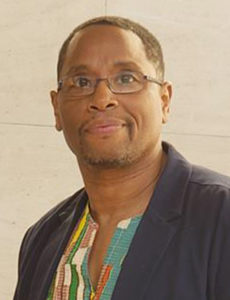 Salim Faraji, professor of Africana studies, presented “Harnessing the Force: Nurturing Wellbeing through Trans-Religious African Spiritual Power” as a guest lecturer for the course Spiritual Care in African Religious Traditions at the Emory University Candler School of Theology. He examined ways of nurturing care across three African Diaspora religion practices–African American Baptist traditions, Ancient Nubian, and Egyptian–and the indigenous spirituality of the Akan people of Ghana, West Africa.
Salim Faraji, professor of Africana studies, presented “Harnessing the Force: Nurturing Wellbeing through Trans-Religious African Spiritual Power” as a guest lecturer for the course Spiritual Care in African Religious Traditions at the Emory University Candler School of Theology. He examined ways of nurturing care across three African Diaspora religion practices–African American Baptist traditions, Ancient Nubian, and Egyptian–and the indigenous spirituality of the Akan people of Ghana, West Africa.
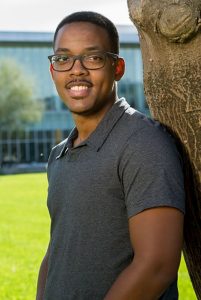 Jonathan Henderson, adjunct faculty of Africana studies, was hired as a senior analyst for the Los Angeles County Anti-Racism Diversity Initiative and as a research associate for the Community College Equity Assessment Lab (CCEAL), which helps community colleges assess challenges to equity-centered institutional effectiveness. Additionally, he gave two recent talks as a panelist for the UCLA Vice Provost Initiative for Pre-College Students and as a presenter for MiraCosta College’s Black Student Leadership Retreat.
Jonathan Henderson, adjunct faculty of Africana studies, was hired as a senior analyst for the Los Angeles County Anti-Racism Diversity Initiative and as a research associate for the Community College Equity Assessment Lab (CCEAL), which helps community colleges assess challenges to equity-centered institutional effectiveness. Additionally, he gave two recent talks as a panelist for the UCLA Vice Provost Initiative for Pre-College Students and as a presenter for MiraCosta College’s Black Student Leadership Retreat.
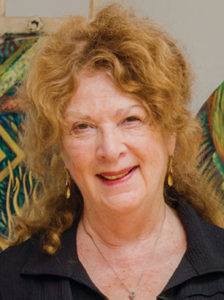 Gilah Yelin Hirsch, professor of art emerita, authored the following articles and essays: “Meeting Elmer Green” for WINN (What is Needed Now?), “Brush or Pen: 1000 Strokes or a Thousand Words?” in The International Journal of Healing and Caring, “An Artist’s Styles of Discourse: Words, Strokes, Image, Action – a Quiver of Expressive Media Probing the Unknown” in The Polish Journal of Aesthetics, and “The Yelin Family Torah: Gilah’s Story” for Medium from 2021-2022.
Gilah Yelin Hirsch, professor of art emerita, authored the following articles and essays: “Meeting Elmer Green” for WINN (What is Needed Now?), “Brush or Pen: 1000 Strokes or a Thousand Words?” in The International Journal of Healing and Caring, “An Artist’s Styles of Discourse: Words, Strokes, Image, Action – a Quiver of Expressive Media Probing the Unknown” in The Polish Journal of Aesthetics, and “The Yelin Family Torah: Gilah’s Story” for Medium from 2021-2022.
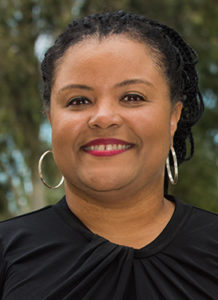 Donna Nicol, professor and chair of Africana studies, authored “Racism and the roots of conservative philanthropy in the U.S.” for Al Jazeera’s Unpack the Past series. The article examines ways in which white racial fears, in the wake of African American demands for civil rights starting in the 1940s, gave rise to conservative philanthropic investment aimed at protecting the economic interests of the wealthy business elite classes.
Donna Nicol, professor and chair of Africana studies, authored “Racism and the roots of conservative philanthropy in the U.S.” for Al Jazeera’s Unpack the Past series. The article examines ways in which white racial fears, in the wake of African American demands for civil rights starting in the 1940s, gave rise to conservative philanthropic investment aimed at protecting the economic interests of the wealthy business elite classes.
Nicol also presented a workshop “Why is This Happening? Understanding the Critical Race Theory Debates” for the Junior States of America Winter Congress.
College of Business Administration & Public Policy
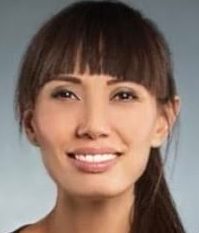 Jennifer Brodmann, assistant professor of finance and faculty researcher, presented at the L.A. County Economy Development Corporation’s event “The Future of Cannabis: Growing from the Ground up,” which examined recent trends and potential opportunities in Southern California’s cannabis industry.
Jennifer Brodmann, assistant professor of finance and faculty researcher, presented at the L.A. County Economy Development Corporation’s event “The Future of Cannabis: Growing from the Ground up,” which examined recent trends and potential opportunities in Southern California’s cannabis industry.
College of Extended & International Education
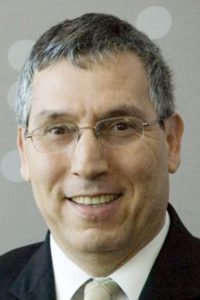 Hamoud Salhi, associate dean of international education, was a featured panelist for the AL 24 News channel’s special coverage of the Russian military operation in Ukraine. Amidst the Russian-Ukraine war, the United States has decided to ban Russian imports. Salhi discussed whether this is a good idea and what this means for the economy.
Hamoud Salhi, associate dean of international education, was a featured panelist for the AL 24 News channel’s special coverage of the Russian military operation in Ukraine. Amidst the Russian-Ukraine war, the United States has decided to ban Russian imports. Salhi discussed whether this is a good idea and what this means for the economy.
College of Health, Human Services & Nursing
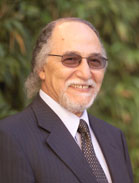 Amer El-Ahraf, emeritus professor of health sciences and former president of the National Environmental Health Association, authored “Dietary Modification as a Control Measure of a Naturally Occurring Environmental Carcinogen: The role of dietary fat source modification on the toxic and carcinogenic effects of Aflatoxin Bi,” a research paper accepted for presentation at the Association’s 2022 conference.
Amer El-Ahraf, emeritus professor of health sciences and former president of the National Environmental Health Association, authored “Dietary Modification as a Control Measure of a Naturally Occurring Environmental Carcinogen: The role of dietary fat source modification on the toxic and carcinogenic effects of Aflatoxin Bi,” a research paper accepted for presentation at the Association’s 2022 conference.
College of Natural & Behavioral Sciences
 Erin McCauley, assistant professor of chemistry, co-authored “Natural Product Phenolic Diglycosides Created from Wildfires, Defining Their Impact on California and Oregon Grapes and Wines” for the American Chemical Society’s Journal of Natural Products. The study discusses the effect wildfires in the West are having on the wine industry, as well as which grapes and wines are impacted by smoke taint.
Erin McCauley, assistant professor of chemistry, co-authored “Natural Product Phenolic Diglycosides Created from Wildfires, Defining Their Impact on California and Oregon Grapes and Wines” for the American Chemical Society’s Journal of Natural Products. The study discusses the effect wildfires in the West are having on the wine industry, as well as which grapes and wines are impacted by smoke taint.
Recent quotes and/or interviews in the media from faculty
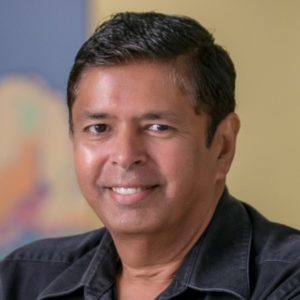 “Workers in occupations that require them to be face to face, such as in health care, retail, dining, and hospitality industries, wonder if the wages are commensurate with the health risks that they take daily. Fear of contracting the deadly virus may lead them to spend more time with their loved ones and to consider a change in occupations, or a trend towards a work balance that they are truly passionate about.” – Prakash Dheeriya, professor of finance, was quoted in WalletHub about how the pandemic has changed working trends in American workers and what policies governments should instill to ensure trust between employer and employee. He was also quoted by Reform Austin about the importance of quality of life to American workers.
“Workers in occupations that require them to be face to face, such as in health care, retail, dining, and hospitality industries, wonder if the wages are commensurate with the health risks that they take daily. Fear of contracting the deadly virus may lead them to spend more time with their loved ones and to consider a change in occupations, or a trend towards a work balance that they are truly passionate about.” – Prakash Dheeriya, professor of finance, was quoted in WalletHub about how the pandemic has changed working trends in American workers and what policies governments should instill to ensure trust between employer and employee. He was also quoted by Reform Austin about the importance of quality of life to American workers.
“Ernest is one of the most passionate creatures in the world. I know his students were very stimulated by the sheer energy that emanated from this man.” – Gilah Yelin Hirsch, professor of art emerita, was quoted by the Los Angeles Times about Emeritus Professor of Art Ernest Rosenthal, who retired in 1985. The quote was part of a profile of Rosenthal, who just turned 102 and is showing an 80-year collection of his art at Tin Flats Gallery in Los Angeles.
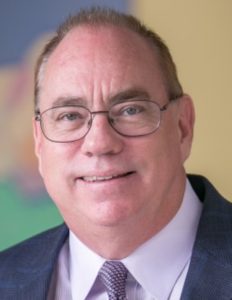 “The credit card company cannot turn off your lights, but the electric company can (although several laws regulate the ability of electric companies to do so). However, electricity is one of those basic needs. For most people, it is pretty difficult to live without it. So, the fact that 40% of Americans are worried about missing an electricity payment is scary […] Personal financial management should be a required course for every high school and college student in this country.” – Michael Manahan, lecturer of finance, spoke toWalletHub about late payments and whether or not credit card companies provided lenience during the pandemic.
“The credit card company cannot turn off your lights, but the electric company can (although several laws regulate the ability of electric companies to do so). However, electricity is one of those basic needs. For most people, it is pretty difficult to live without it. So, the fact that 40% of Americans are worried about missing an electricity payment is scary […] Personal financial management should be a required course for every high school and college student in this country.” – Michael Manahan, lecturer of finance, spoke toWalletHub about late payments and whether or not credit card companies provided lenience during the pandemic.
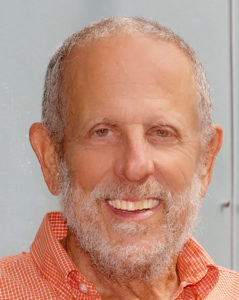 “[Starlink’s satellites] are valuable tools for communication by political and resistance leaders and journalists, if they are unable to safely access the internet or it is blocked.” – Larry Press, professor of information systems, provided The Mercury News his opinion on the Starlink satellites sent to Ukraine to deflect Russian control of their Internet access.
“[Starlink’s satellites] are valuable tools for communication by political and resistance leaders and journalists, if they are unable to safely access the internet or it is blocked.” – Larry Press, professor of information systems, provided The Mercury News his opinion on the Starlink satellites sent to Ukraine to deflect Russian control of their Internet access.
 “They’re only cryptic to us, and our limited sensory perception.” – Sonal Singhal, assistant professor of biology, was interviewed by National Geographic about our inability to see a type of morphologically cryptic lizards in Australia.
“They’re only cryptic to us, and our limited sensory perception.” – Sonal Singhal, assistant professor of biology, was interviewed by National Geographic about our inability to see a type of morphologically cryptic lizards in Australia.




